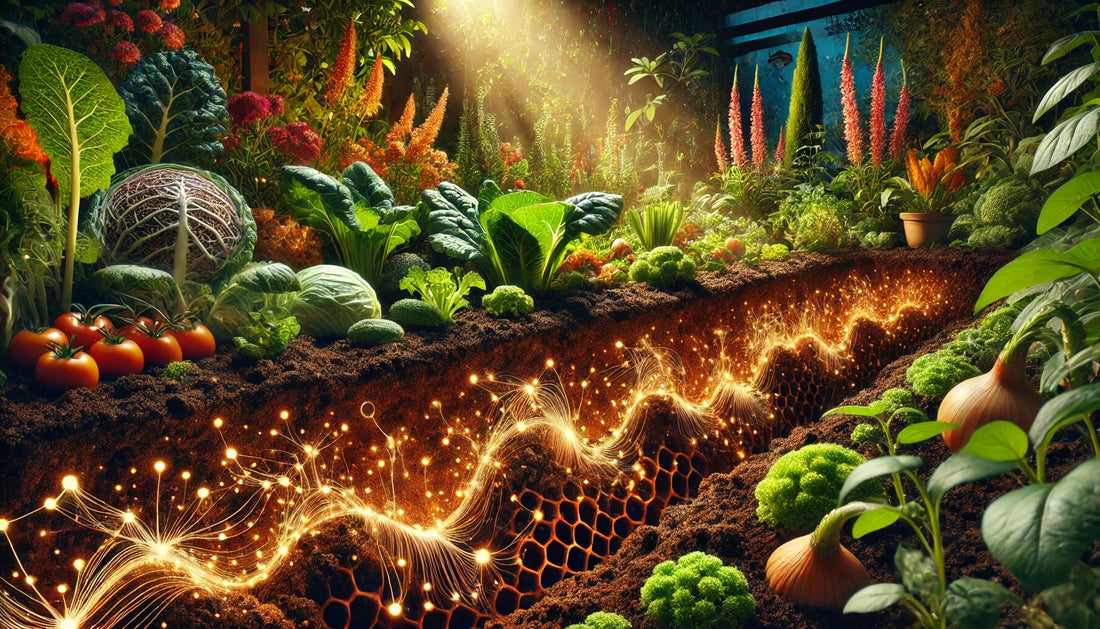
Bio-Char: Unlocking the Soil Food Web for Living Soils, Market Gardens, and Regenerative Agriculture
Share
What Is Biochar?
Biochar is a stable, carbon-rich material produced by heating organic biomass (such as wood or crop residues) in a low-oxygen environment—a process called pyrolysis. Unlike ash, biochar retains the carbon structure of its source material, creating a highly porous, lightweight material. It is hailed for its ability to improve soil health, sequester carbon, and support sustainable agriculture.
A Glimpse Into the Past: Biochar and the Amazonian Tribes
The roots of biochar trace back thousands of years to the Amazon Basin, where ancient tribes created terra preta ("black earth"). These soils, enriched with biochar, organic waste, and bones, remain some of the most fertile in the world today. The addition of biochar allowed these tribes to sustain agricultural practices in otherwise nutrient-poor tropical soils. Modern research suggests the biochar acted as a nutrient reservoir and habitat for beneficial microbes, turning these soils into long-term productivity powerhouses.
How Biochar Benefits Soils and Ecosystems
Biochar’s unique properties make it a multi-functional tool for various agricultural systems:
-
Improving Soil Structure
The porous nature of biochar improves soil aeration, drainage, and water retention, especially in sandy or degraded soils. In clay soils, it helps reduce compaction and improves root penetration. -
Enhancing Microbial and Fungal Life
Biochar serves as a habitat for beneficial microbes and fungi. Its pores act as protective niches for microbial communities, and its carbon surface binds nutrients, making them accessible to soil biology. Biochar has shown to support mycorrhizal fungi, essential for nutrient cycling and plant health. -
Nutrient Retention and Cycling
Biochar acts as a "nutrient sponge," retaining essential nutrients like nitrogen, phosphorus, and potassium while preventing leaching. This is particularly useful for organic growers and living soil systems where nutrient loss is a concern. -
Carbon Sequestration
Because biochar is resistant to decomposition, it locks carbon in the soil for centuries, making it a critical tool in combating climate change. -
Reducing Soil Toxins
Biochar can bind heavy metals, pesticides, and other pollutants, detoxifying contaminated soils and improving overall health.
Biochar in Market Gardens, Agricultural Land, and Living Soil Systems
Biochar's adaptability makes it a valuable resource across various agricultural settings:
Market Gardens: Building Fertile Ground with Bio-Char
Bio-char plays a crucial role in the success of market gardens, which rely on fertile, biologically active soils to maximise productivity. By enhancing the soil food web, bio-char boosts microbial activity and fungal growth, creating a thriving ecosystem that supports healthy crops. Its ability to improve water retention and nutrient cycling is vital for small-scale growers managing diverse crops in high-density systems. Incorporating bio-char into composts or soil blends not only stabilises pH but also provides a long-term carbon sink, promoting sustainable soil management. Market gardeners who combine bio-char with biological soil testing can monitor soil health effectively and fine-tune their practices for consistent, high-quality yields.
Agricultural Land: Regenerating Soil with Bio-Char and the Soil Food Web
In large-scale agriculture, bio-char serves as a cornerstone for regenerative practices, working synergistically with the soil food web to improve soil structure and fertility. Its porous surface retains nutrients, reduces fertiliser leaching, and mitigates the environmental impact of intensive farming systems. Bio-char is especially effective in degraded soils, helping to restore microbial diversity and organic matter critical for soil health. Paired with cover cropping and crop rotation, bio-char supports a biologically rich soil system that resists erosion and enhances water infiltration. Regular biological soil testing enables farmers to track improvements, ensuring that bio-char applications are tailored to optimise yields while protecting natural resources.
Living Soil Systems: Harnessing Bio-Char for a Thriving Soil Food Web
Living soil growers depend on the interconnected organisms within the soil food web to drive nutrient cycling and plant health. Bio-char amplifies these processes by creating microhabitats for microbes, protozoa, and mycorrhizal fungi, all essential components of a balanced soil ecosystem. When inoculated with compost tea or microbial amendments, bio-char becomes a biologically active powerhouse that enriches living soil systems. Its ability to stabilise soil structure and maintain fungal hyphal networks ensures long-term viability in no-till or low-till setups. Growers focused on high-value crops like cannabis benefit from integrating bio-char with regular biological soil testing, which helps fine-tune microbial populations and optimise nutrient availability for exceptional results.
Application Tips for Growers
-
Charging Biochar
Biochar works best when "charged" with nutrients and microbes before application. This can be done by soaking it in compost tea, worm leachate, or nutrient-rich water for a few days. -
Blending Ratios
A typical application rate is 5–10% biochar by soil volume. This balance ensures soil improvement without overloading the system.
Theories and Future Possibilities
- Soil Climate Engineering: Researchers are exploring biochar’s role in regulating soil temperatures and reducing greenhouse gas emissions.
- Customised Biochar: By using specific feedstocks or inoculants, biochar could be tailored for particular soil types or crops.
- Fungal Symbiosis: Some studies suggest biochar can amplify fungal networks, potentially boosting plants' ability to communicate and share resources.
Conclusion: Biochar—The Soil’s Black Gold
From the ancient Amazonian tribes to modern agricultural systems, biochar has proven its worth as a transformative soil amendment. Its ability to enhance soil health, support microbial life, and sequester carbon makes it a critical tool in sustainable farming. As we continue to study its potential, biochar could hold the key to healthier soils and a healthier planet.
1 comment
Very interesting read, I really enjoyed this article.